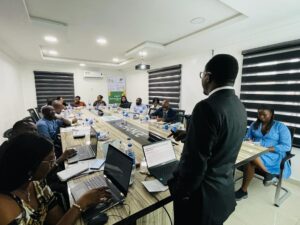Recognizing that evidence-backed advocacy is critical for dismantling the drivers of shrinking civic space in West Africa, Spaces for Change | S4C organized a two-day research and knowledge-building (RKB) clinic to strengthen the research capabilities of 11 civil society organizations (CSOs) from Nigeria, Ghana, and Senegal. The Clinic, organized under the auspices of the Ford Foundation-supported Civic Space Resource Hub (CSR-Hub) for West Africa, forms part of a broader strategy to safeguard the civic space by empowering national organizations to conduct rigorous research and build credible evidence that can inform their accountability campaigns, public decision-making, and home-grown solutions to the problems affecting the continent.
The first day of the clinic set the stage for a deep exploration of the concepts of human rights and social justice. RKB facilitators provided deep insights into the importance of promoting equality, inclusivity, and fairness in society. Participants gained an understanding of human rights frameworks, international conventions, and the mechanisms available for protecting and enforcing these rights nationally and internationally. The sessions sparked discussions on the application of a rights-based approach to addressing social inequalities and injustices, with a specific focus on the role of civil society organizations (CSOs) in driving positive change.
Other presentations delved into the realm of social justice research. Facilitators provided in-depth guidance on the methodologies, approaches, and ethical considerations involved in conducting research through a social justice lens. Participants learned the importance of formulating research questions that address systemic inequalities, power imbalances, and the perspectives of marginalized communities. Through case studies and practical examples, facilitators highlighted the significance of collecting and analyzing both qualitative and quantitative data to build a robust evidence base for advocacy.
Participants were also introduced to various research methods and tools that are commonly used in social justice research, such as interviews, surveys, focus groups, and data analysis techniques. They gained practical skills in data collection, including techniques for ensuring ethical and respectful engagement with research participants. The need for rigorous and ethical research practices, including informed consent, confidentiality, data protection, well-being, and safety of respondents in sensitive contexts, were also emphasized.
The Clinic also involved extensive group exercises, focused group discussions, and knowledge-sharing sessions. These group activities aimed to foster collaboration, experience-sharing, peer learning, brainstorming ideas, and collaborative problem-solving. Through these activities, participants gained insights into different approaches and techniques employed by their peers, expanding their own repertoire of research and writing strategies. Other topics explored over the two days include research proposal writing, planning research investigations, digital safety, secure data storage, ethical considerations, academic writing, and evidence-building techniques. Recognizing that technology plays a pivotal role in conducting research effectively, facilitators walked participants through the risks that come with handling digital data and the importance of safeguarding sensitive information from unauthorized access or breaches. One key aspect discussed was encryption, which involves encoding data to make it unreadable to unauthorized individuals. Participants learned about different encryption techniques and tools that can be used to protect sensitive data. They gained insights into encryption algorithms and the importance of using strong encryption methods to safeguard their research data.
As the two-day clinic came to a close, participants expressed their gratitude for the valuable knowledge and skills they had gained. The Civic Space Resource Hub for West Africa (CSR-Hub) serves as a valuable resource center dedicated to promoting an open civic space and strengthening the voices of civil society across the subregion. By enhancing the research capacities of organizations, the Hub empowers civil society to drive positive change, foster inclusive governance, and safeguard the civic space through the power of credible research.




